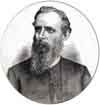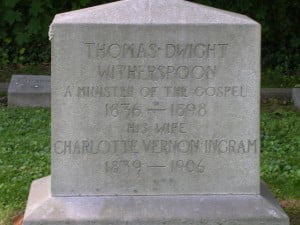Pastor Witherspoon Goes Off to War
 Like many clergymen of the South, Thomas Dwight Witherspoon entered Confederate service in the War Between the States in 1861. First as a common soldier with the rank of Private, the young twenty-five year old eventually became a chaplain with the Forty-Second Mississippi of A.P. Hill’s Corps.
Like many clergymen of the South, Thomas Dwight Witherspoon entered Confederate service in the War Between the States in 1861. First as a common soldier with the rank of Private, the young twenty-five year old eventually became a chaplain with the Forty-Second Mississippi of A.P. Hill’s Corps.
Thomas Witherspoon was born in 1836 of two godly parents, Franklin and Agnes Witherspoon. They were described as Presbyterian in principle and Christians of ardent piety. Thomas’s father died when he was four years of age. It was left up to his mother to rear him in the principles and practices of the Christian faith. At age 12, he professed Christ as his Lord and Savior.
Education at the University of Mississippi brought him Bachelor’s and Master’s degrees in 1856 and 1858. Studying under Dr. James H. Thornwell at Columbia Theological Seminary, he was enabled to graduate in 1859. By 1860, he was ordained by the Chickasaw Presbytery into the Presbyterian ministry.
He only had one pastorate before the Civil War broke out in 1861. Entering the 11th, the 2nd, and finally the 42nd Mississippi Infantry Regiments brought him all the challenges of a soldier and then as a Christian chaplain. Described as an able and attractive preacher of the soul-saving truths of the gospel, he found himself a prisoner of Union forces after the battle of Gettysburg, Pennsylvania. Let him relate the story:
“I was captured in the afternoon of a beautiful Sabbath day, the fifth of July, 1863, in a hospital tent, in the midst of a religious service, surrounded by the wounded on every hand, to whom I was ministering, and at whose urgent solicitation I had voluntarily remained within the enemy’s line.”
Accompanying the body of his commander who was killed during Pickett’s charge, down to Baltimore, for transport to Richmond, Virginia, Chaplain Witherspoon was imprisoned for a time at Fort McHenry, Baltimore, before being paroled in 1863. Eventually he would return to the Confederate army, where he would fight until surrender at Appomattox Court House, Virginia.
 Rev. Dr. Thomas D. Witherspoon served five more Presbyterian churches after the War. He was recognized by his fellow ministers in the Presbyterian Church, U.S., by being elected moderator in 1884. His final post was as the professor of homiletics at the newly formed Louisville Presbyterian Theological Seminary. Rev. Witherspoon died on November 3, 1898 and is buried in Louisville, Kentucky.
Rev. Dr. Thomas D. Witherspoon served five more Presbyterian churches after the War. He was recognized by his fellow ministers in the Presbyterian Church, U.S., by being elected moderator in 1884. His final post was as the professor of homiletics at the newly formed Louisville Presbyterian Theological Seminary. Rev. Witherspoon died on November 3, 1898 and is buried in Louisville, Kentucky.
Words to Live By: You might have to re-read his own statement of his capture on July 5, 1863. He said, “. . . at whose urgent solicitation (the Confederate wounded) I had voluntarily remained within the enemy’s (Union) lines.” Further, it was “in the midst of a religious service” that the Union forces captured him. It is no wonder that he was described as one of the most devoted, untiring, self-sacrificing efficient chaplain in the Confederate army. We may not be in an army, but we all are members of the militant church of Jesus Christ. Devoted? Untiring? Self-sacrificing? Efficient? Are they traits which are seen by our fellow-soldiers in the army of the Lord Jesus?
The Thomas Dwight Witherspoon Manuscript Collection is preserved at the PCA Historical Center. To read more about this Collection, click here.
Through the Scriptures: Hosea 11 – 14
Through the Standards: The third commandment: Sins forbidden
WLC 113 — “What are the sins forbidden in the third commandment?
A. The sins forbidden in the third commandment are, the not using of God’s name as is required; and the abuse of it in an ignorant, vain, irreverent, profane, superstitious or wicked mentioning or otherwise using his titles, attributes, ordinances,or works, by blasphemy, perjury, all sinful cursing, oaths, vows, and lots; violation of our oaths and vows, if lawful and fulfilling, if of things unlawful; murmuring and quarreling at, curious prying into, and misapplying of God’s decrees and providences; misinterpreting, misapplying, or any way perverting the word, or any part of it; to profane jests, curious and unprofitable questions, vain janglings, or the maintaining of false doctrines; abusing it, the creatures, or any thing contained under the name of God, to charms, or sinful lusts and practices; the maligning, scorning, reviling, or any wise opposing of God’s truth, grace, and ways; making profession of religion in hypocrisy, or for sinister ends; being ashamed of it, or a shame to it, by unconformable, unwise, unfruitful, and offensive walking, or backsliding from it.”
WSC 55 — “What is forbidden in the third commandment?
A. The third commandment forbids all profaning and abusing of any thing whereby God makes himself known.”
